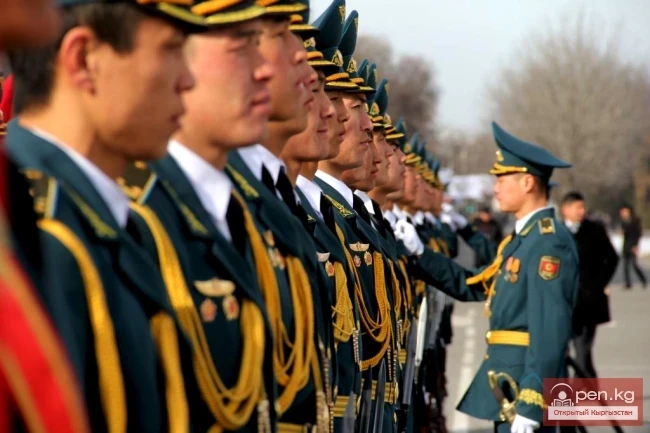Legislative Foundations for the Creation and Functioning of the Military Security Assurance System of the Kyrgyz Republic
Not considering any state or coalition of states as its adversary, and opposing the use of military force to achieve political and economic goals, Kyrgyzstan has nevertheless recognized the necessity of preparing the country to defend against possible armed attacks. Thus, the state has committed itself to maintaining and developing its own armed forces (AF).
The legislative foundations for the creation and functioning of the military security system were defined in the Constitution of the Kyrgyz Republic and initially enshrined in the Military-Defense Concept of the Kyrgyz Republic of 1994, later in the Military Doctrine of the Kyrgyz Republic, as well as in the Defense Law.
Paragraph 1 of Article 9 of the Constitution of the Kyrgyz Republic states: “The Kyrgyz Republic has no goals of expansion, aggression, or territorial claims resolved by military force. It rejects the militarization of state life, subordinating the state and its activities to the tasks of waging war. The Armed Forces of Kyrgyzstan are built according to the principle of self-defense and defensive sufficiency.” According to paragraph 2 of Article 73 of the Constitution, the Government of the Kyrgyz Republic takes measures to ensure the country's defense.
The Military-Defense Concept of the Kyrgyz Republic of 1994 states that “the Kyrgyz Republic does not consider any state or coalition of states as its adversary. Its main goal in the field of security is to prevent wars and armed conflicts.” The principle of self-defense and defensive sufficiency in building the AF is complemented by:
• the principle of correspondence of the organizational structure, combat composition, and strength of the AF to the national security needs of the state;
• the ability to adequately increase combat power in response to rising military threats;
• maintaining combat and mobilization readiness of armed formations at a level corresponding to the evolving situation.
The main defense task, according to the Military-Defense Concept, was considered to be “maintaining, together with other CIS states, a military potential sufficient for their collective defense and ensuring the inviolability of borders, protection of sovereignty, and territorial integrity.”
In the Military Doctrine of 2002, influenced by the so-called Batken wars, the emphasis shifted somewhat. Here, ensuring the military security of the Kyrgyz Republic is recognized as “the most important direction of state activity,” and the main goal of ensuring military security becomes “the protection of sovereignty, territory, and economy of the state, state institutions, and citizens from military threats, preventing aggression or the outbreak of armed conflicts, and creating conditions for the sustainable development of the Kyrgyz Republic.” At the same time, “the Kyrgyz Republic ensures military security with the totality of forces, means, and resources at its disposal. In the event of aggression, the defense of the state implies armed protection, mobilization of all military and economic potential, implementation of civil and territorial defense, as well as joint actions with the armed forces of other states in accordance with international treaties.”
Unlike the Military-Defense Concept, the Military Doctrine already identifies the main threats to military security:
• military-political instability, existing and potential hotspots of armed conflicts in the Central Asian region;
• the ongoing probability of the penetration of illegal armed formations into the territory of the republic;
• the likelihood of weakening regional stability due to excessive quantitative and qualitative buildup of military power by neighboring states and illegal armed formations at the borders of the Kyrgyz Republic;
• the danger of the proliferation of weapons of mass destruction in Central Asia and neighboring regions, as well as the possibility of their use by terrorist organizations;
• reconnaissance, sabotage, and information-propaganda activities by foreign state security services, international extremist and terrorist organizations aimed at undermining the defense capability of the Kyrgyz Republic;
• attempts to interfere in the internal affairs of the Kyrgyz Republic.
Read also:

Tourist Area Management Program
The project "USAID Business Development Initiative" (BGI), within the tourism...
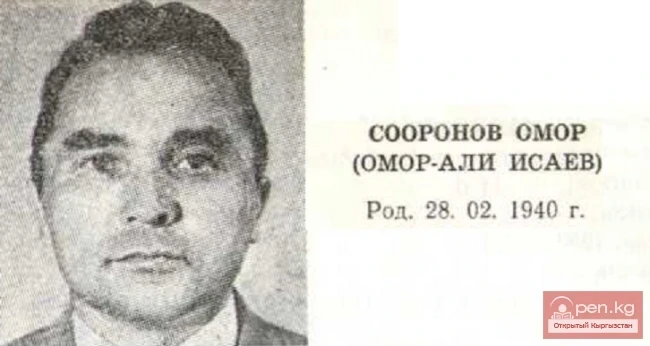
Poet, Critic, Literary Scholar Omor Sooronov
Poet, critic, literary scholar O. Sooronov was born in the village of Gologon in the Bazar-Kurgan...
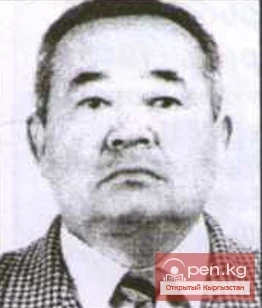
Zhorobekov Zholbors
Zhorobekov Zholbors (1948), Doctor of Political Sciences (1997) Kyrgyz. Born in the village of...
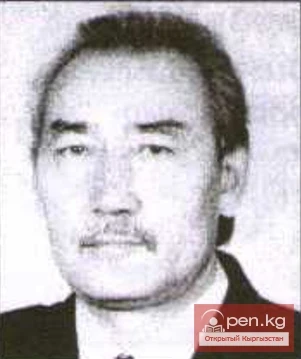
Kenesariyev Tashmanbet
Kenesariyev Tashmanbet (1949), Doctor of Historical Sciences (1998), Professor (2000) Kyrgyz. Born...
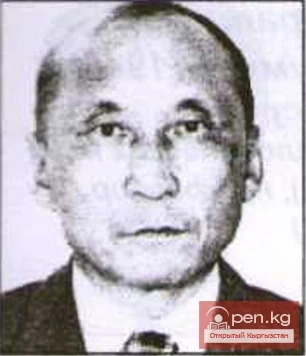
Omuraliyev Ashymkan
Omuraliyev Ashymkan (1928), Doctor of Historical Sciences (1975), Professor (1977) Kyrgyz. Born in...
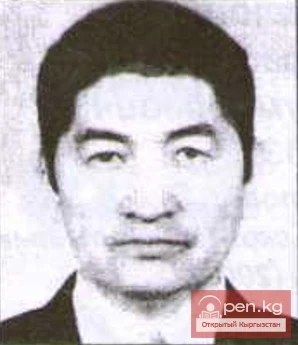
Chorotegin (Choroev) Tynchtykbek Kadyrmambetovich
Chorotegin (Choroев) Tynchtykbek Kadyrmambetovich (1959), Doctor of Historical Sciences (1998),...
Kyrgyzstan (Kyrgyz Republic) - 10 som 1997.
Overview of the banknote of the Kyrgyz Republic with a denomination of 10 som issued in 1997, as...
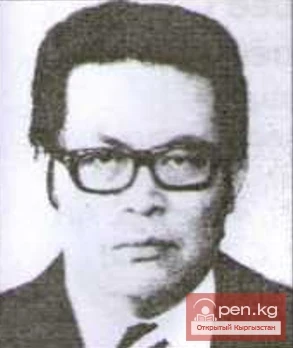
Karymshakov Rakhym Karymshakovich
Karymshakov Rakhym Karymshakovich (1936), Doctor of Physical and Mathematical Sciences (1995),...
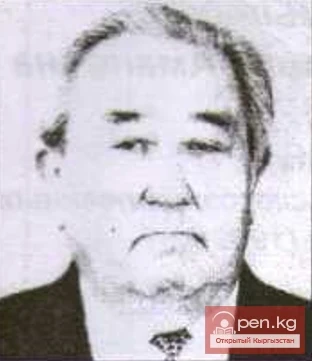
Zhumash Mamytov
Mamytov Jumash (1935), Candidate of Philological Sciences (1967), Professor (2001) Kyrgyz. Born in...
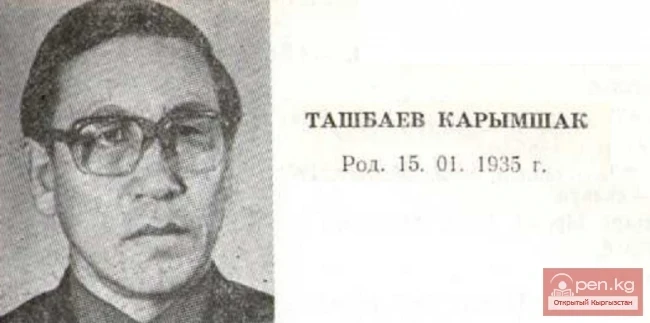
Poet Karymshak Tashbaev
Poet K. Tashbaev was born in the village of Shyrkyratma in the Soviet district of the Osh region...
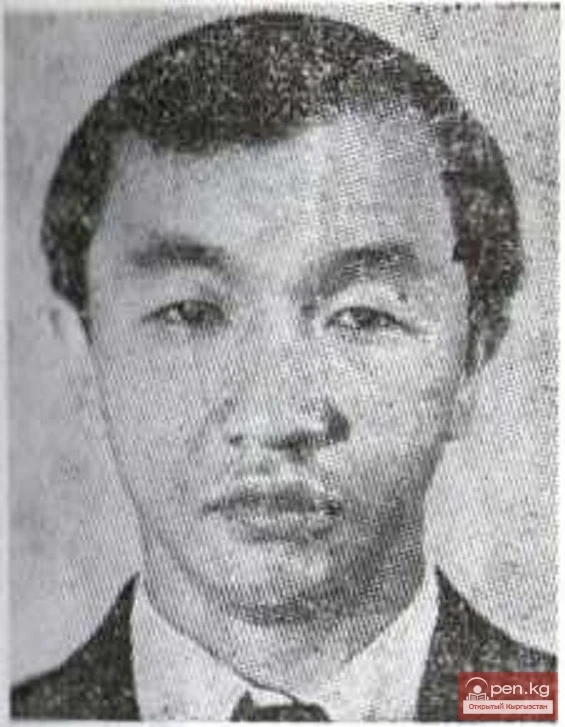
Critic, Literary Scholar Abdyldazhan Akmataliev
Critic and literary scholar A. Akmataliev was born on January 15, 1956, in the city of Naryn,...

Prose Writer, Critic Dairbek Kazakbaev
Prose writer and critic D. Kazakbaev was born on June 20, 1940, in the village of Dzhan-Talap,...
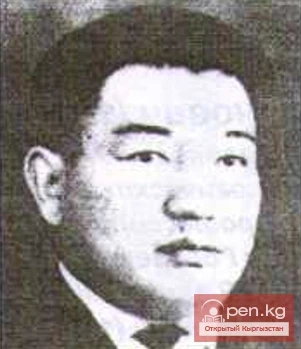
Jursun Suvanbekov
Suvanbekov Jursun (1930-1974), Doctor of Philological Sciences (1971) Kyrgyz. Born in the village...
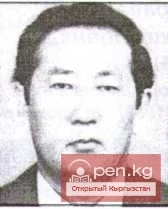
Bazarbai Shamsi (1937)
Bazarbaev Shamshi (1937), Doctor of Philosophy (1993), Professor (1995). Kyrgyz. Born in the...
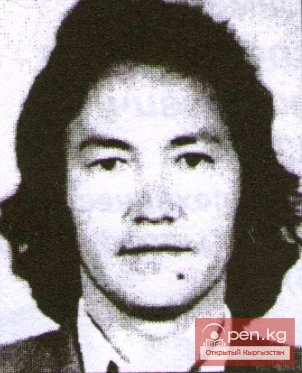
Usubaliev Beishenbai Shenkievich
Usubaliev Beishenbay Shenkievich (1954), Doctor of Philological Sciences (1994) Kyrgyz. Born in...
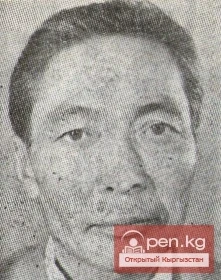
The title translates to "Poet Soviet Urmambetov."
Poet S. Urmambetov was born on March 12, 1934, in the village of Toru-Aigyr, Issyk-Kul District,...
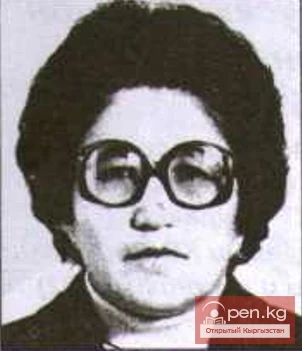
Toichubekova Burulkan
Toichubekova Burulkan (1932), Doctor of Philological Sciences (1994) Kyrgyz. Born in the village...
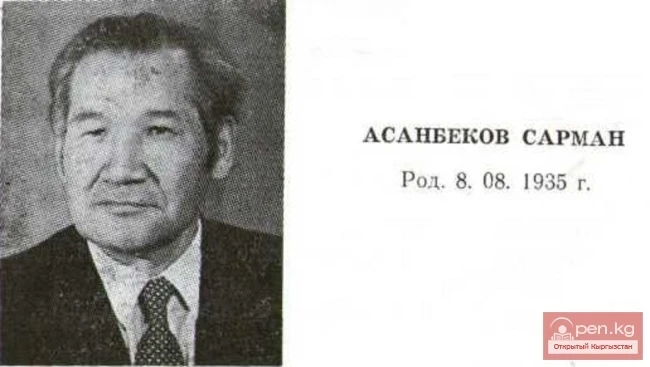
Poet, Art Historian Sarman Asanbekov
Poet and art critic S. Asanbekov was born in the village of Aral in the Talas region of Kyrgyzstan...

Prose Writer, Journalist Djapar Saatov
Prose writer, journalist Dzh. Saatov was born on February 15, 1930, in the village of Alchaluu,...
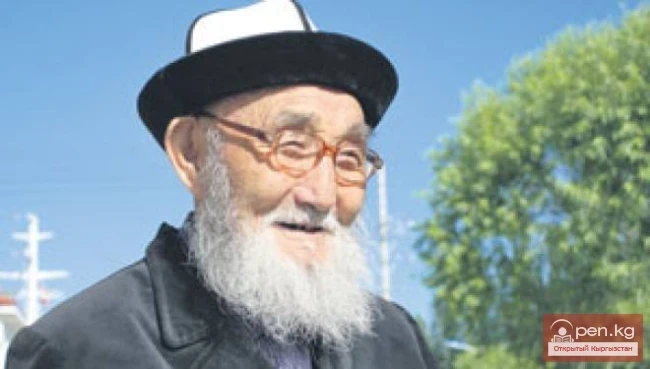
Kyrgyzstan bids farewell to the storyteller Jusuп Mamaev
On June 1, the great storyteller of the epic "Manas," Jusup Mamay, passed away at the...
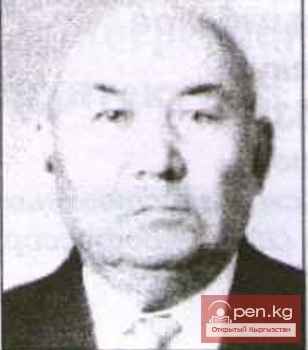
Kasymbekov Beishabay
Kasybekov Beyshabay (1933), Doctor of Veterinary Sciences (1991), Professor (1998) Kyrgyz. Born in...
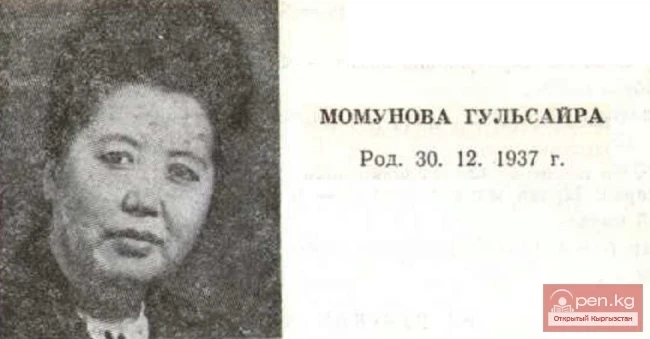
The Poet Gulsaira Momunova
Poet G. Momunova was born in the village of Ken-Aral in the Leninpol district of the Talas region...
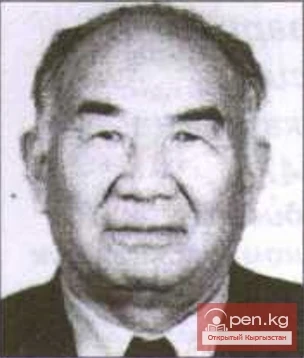
Nazarov Madamin Nazarovich
Nazarov Madamin Nazarovich (1933), Candidate of Pedagogical Sciences (1957), Professor (1961)...
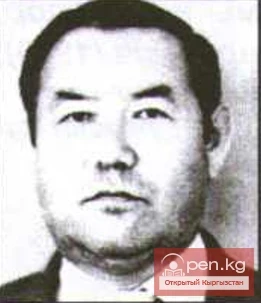
Zhanibekov Zheenbek
Zhanibekov Zheenbek (1932), Doctor of Philosophy (1993), Professor (1994) Kyrgyz. Born in the...
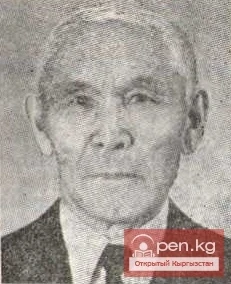
Literary scholar, prose writer, poet Dzaki Tashtemirov
Literary scholar, prose writer, poet Dz. Tashtemirov was born on October 15, 1913—October 7, 1988,...
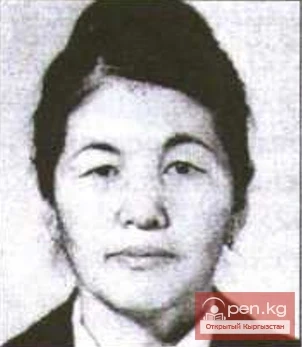
Karimova Burul Karimovna
Karimova Burul Karimovna (1939), Doctor of Biological Sciences (1997), Professor (1998) Kyrgyz....

The Poet Kubanych Akaev
Poet K. Akaev was born on November 7, 1919—May 19, 1982, in the village of Kyzyl-Suu, Kemin...
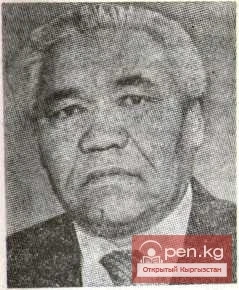
Prose Writer Kachkynbay (KYRGYZBAI) Osmonaliev
Prose writer K. Osmonaliev was born on March 5, 1929, in the village of Chayek, Jumgal district,...
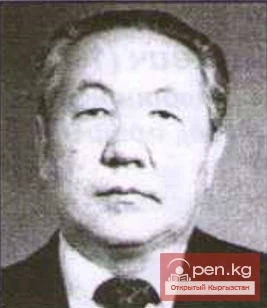
Zakirov Saparbek
Zakir Saparbek (1931-2001), Candidate of Philological Sciences (1962), Professor (1993) Kyrgyz....
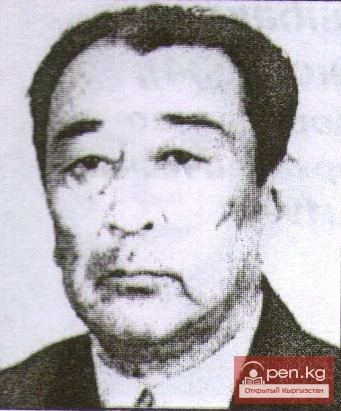
Abdykadir Sadikov
Sadykov Abdykadir (1933), Doctor of Philological Sciences (1972), Professor (1983), Corresponding...
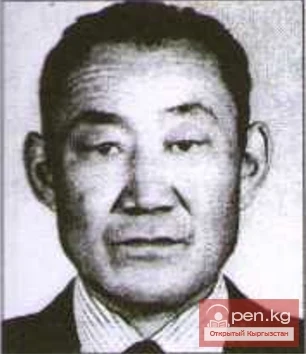
Osmonov Anvar Osmonovich
Osmonov Anvar Osmonovich (1941), Doctor of Veterinary Sciences (2000) Kyrgyz. Born in the village...

Poet, Prose Writer Medetbek Seitaliev
Poet and prose writer M. Seitaliev was born in the village of Uch-Emchek in the Talas district of...
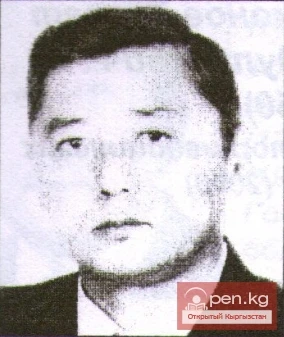
Oskyon Dzhusupbekovich Osmonov
Oskon Osmonov Jusupbekovich (1954), Doctor of Historical Sciences (1994), Professor (1996) Kyrgyz....
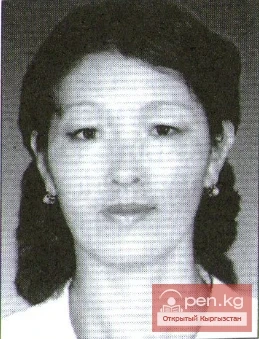
Atkurova Altynai Razbaevna
Attykurova Altynai Razbaevna Art historian. Born on November 23, 1973, in the village of Gulcha,...
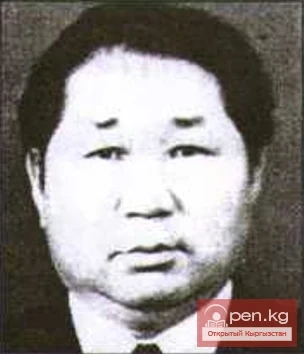
Salamatov Zholdon
Salamatov Zholdon (1932), Doctor of Physical and Mathematical Sciences (1995), Professor (1993)...
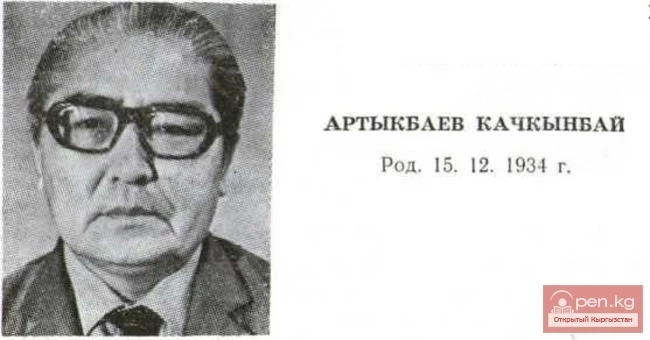
Critic, Literary Scholar, Poet Kachkynbai Artykbaev
Critic, literary scholar, poet K. Artykbaev was born in the village of Keper-Aryk in the Moscow...
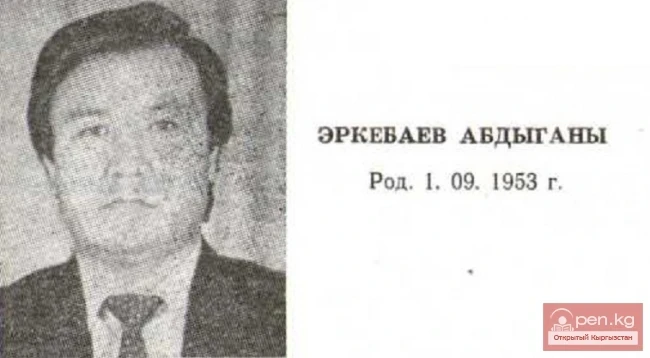
Critic, Literary Scholar Abdygany Erkebayev
Critic, literary scholar A. Erkebayev was born in the village of Kara-Teyit in the Alaï district...
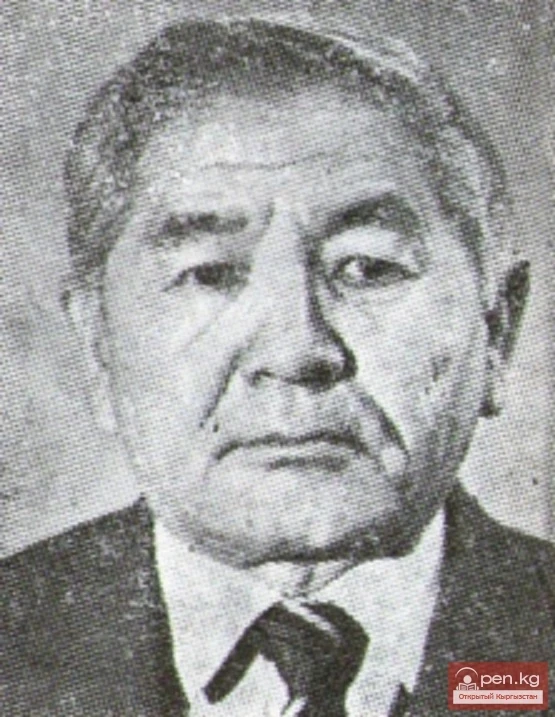
Poet Dzhaparkul Alybaev
Poet Dzh. Alybaev was born on October 12, 1933, in the village of Birikken, Chui region of the...
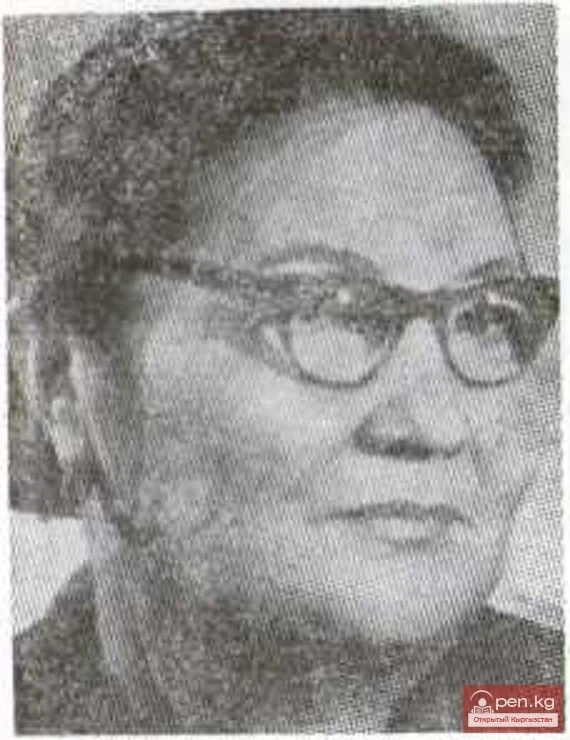
The Poet Tenti Adysheva
Poet T. Adysheva was born in 1920 and passed away on April 19, 1984, in the village of...
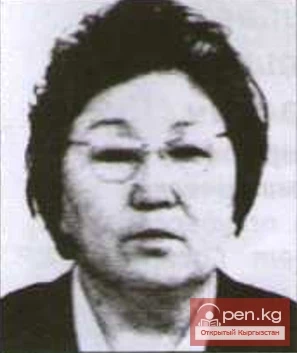
Kerimzhanova Bubu Dyikanbaevna
Kerimjanova Bubu Dyikanbaevna (1920-1993), Candidate of Philological Sciences, Corresponding...
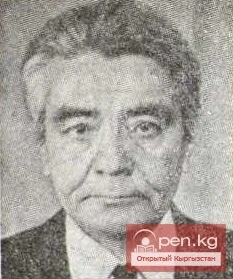
Critic, Literary Scholar, Prose Writer Sharshenbek Umetaliev
Critic, literary scholar, prose writer Sh. Umetaliev was born on February 10, 1925, in the village...
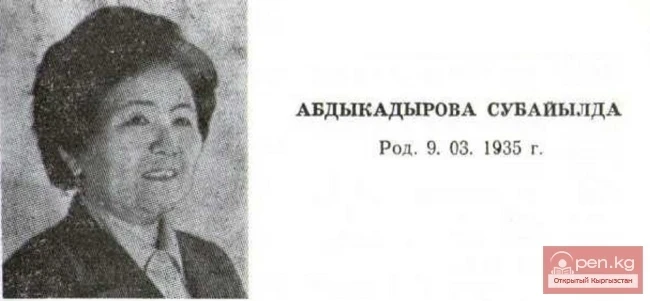
The Poet Subayilda Abdykadyrov
Poet S. Abdykadyrova was born in the village of Sary-Bulak in the Kalinin district of the Kirghiz...
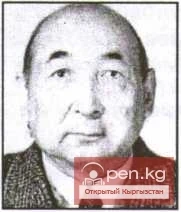
Toktusun Ashirbaev (1948), Doctor of Philological Sciences
Ashirbaev Toktosun (1948), Doctor of Philological Sciences (2001). Kyrgyz. Born in the village of...

Critic, Literary Scholar A. Sadykov
Critic and literary scholar A. Sadikov was born in the village of Kara-Suu in the At-Bashinsky...
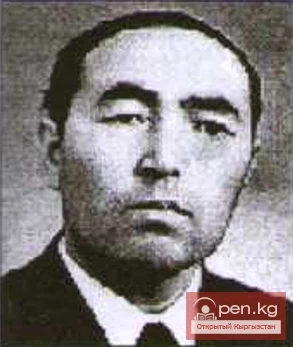
Tabaldiev Asanbek
Tabaldiev Asanbek (1935-1975), Doctor of Philosophy (1971), Professor, Corresponding Member of the...
Terskey Alatau, Tian Shan
Journey through the Terskey Alatau and Tian Shan...
